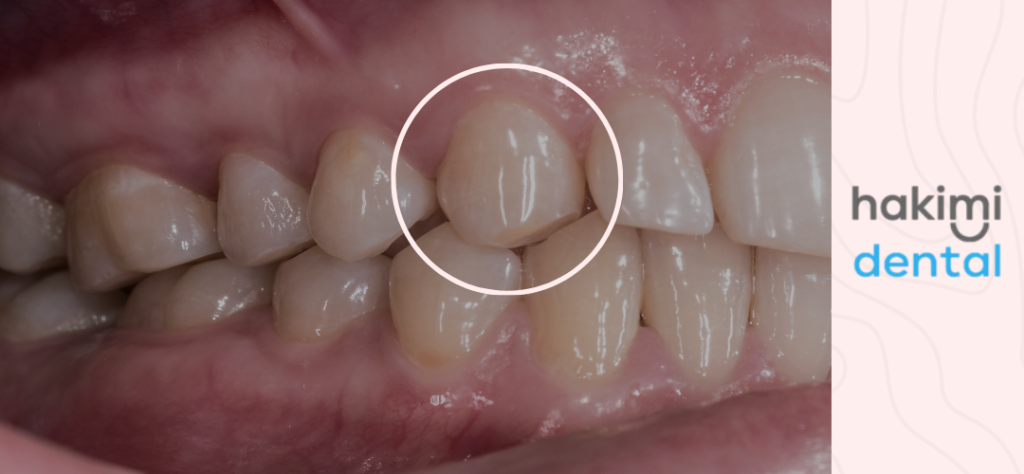Everything You Need to Know About Your Eye Tooth: Care, Issues, and Treatment
We all know the names of the more common teeth – molars, incisors, and canines. But did you know that one of your canines has a unique name? The eye tooth is a common term used to describe the upper canine tooth, and it plays an important role in your dental health.
In this blog, we’ll explain what an eye tooth is, why it’s called that, common issues associated with it, and how to care for and treat problems if they arise. Whether you’re experiencing pain, have noticed something unusual, or just want to learn more about this key tooth, we’ll provide clear and informative answers.
If you need expert advice on how to maintain your dental health or are concerned about your eye tooth, visit Hakimi Dental Clinic, where our team is dedicated to providing excellent care.

What is an Eye Tooth?
The term eye tooth refers to the upper canine teeth – the pointed teeth located between your incisors (front teeth) and premolars. You have two eye teeth, one on either side of your upper jaw. These teeth are essential for biting and tearing food, and they also play a key role in maintaining the structure of your mouth and supporting the position of the other teeth.
The name “eye tooth” comes from the location of these teeth, as they are positioned directly beneath the eyes. This is reflected in the Latin term for the eye tooth, cuspid or caninus, as these teeth are also referred to as canine teeth due to their long, pointed shape, similar to the teeth of a dog or other carnivores.
The Importance of the Eye Tooth
The eye tooth is more than just a sharp tooth for tearing food. It plays several important roles in the function and appearance of your smile:
1. Supporting Jaw Structure
Your eye teeth help support the structure of your mouth by maintaining the shape of your jaw and ensuring that your other teeth remain aligned. Without them, neighbouring teeth could shift, potentially leading to misalignment and bite issues.
2. Aesthetic Importance
The position of your eye teeth at the front of your smile means they are highly visible when you talk or smile. Their shape and placement contribute to the overall look of your smile, helping to create balance and symmetry.
3. Biting and Chewing
The pointed shape of the eye tooth makes it particularly useful for gripping and tearing food. This functionality is especially important for eating tougher foods like meat or fibrous vegetables.
4. Guiding Jaw Movement
Your eye teeth also help guide your jaw movements, especially when you bite and chew. They work with your other teeth to ensure that your bite is aligned properly, which helps prevent issues like uneven wear or jaw pain.
Common Problems with the Eye Tooth
While your eye tooth is strong and durable, it can sometimes be the source of certain dental problems. Below are some of the common issues that people experience with their eye teeth:
1. Impacted Eye Tooth
An impacted tooth is one that hasn’t erupted through the gum as expected. It can be caused by a lack of space in the mouth or the tooth growing at an abnormal angle. This is particularly common with eye teeth because they are the last to come through during childhood, usually between the ages of 11 and 13.
If an eye tooth is impacted, it can lead to discomfort, misalignment of other teeth, or even cyst formation around the impacted tooth. Treatment often involves creating space in the jaw or, in some cases, surgically uncovering the tooth.
2. Eye Tooth Pain
Pain around the eye tooth can arise for several reasons. You may experience discomfort due to tooth decay, gum disease, or an abscess (infection at the root of the tooth). Pain in the eye tooth can also be linked to sinus pressure, as the upper canine is located close to the sinuses.
If you’re experiencing persistent pain in your eye tooth, it’s important to visit a dentist for an examination and treatment to prevent further complications. You can schedule an appointment at Hakimi Dental Clinic for a thorough check-up.
3. Eye Tooth Sensitivity
Sensitivity in the eye tooth can occur if the enamel has worn down or if the gum around the tooth has receded, exposing the sensitive dentin underneath. This can cause discomfort when eating or drinking hot, cold, or sweet foods. Using toothpaste designed for sensitive teeth and avoiding overly abrasive brushing techniques can help manage sensitivity.
4. Wear and Tear
Due to their pointed shape, eye teeth are more prone to wear and tear over time, especially if you grind or clench your teeth (a condition known as bruxism). This wear can flatten the tooth, making it less effective for biting and chewing, and it can also cause aesthetic changes. In some cases, dental treatment such as bonding or veneers may be necessary to restore the tooth’s shape and function.
How to Care for Your Eye Tooth
Looking after your eye teeth is just as important as caring for any other part of your mouth. Proper oral hygiene and regular dental visits are crucial for maintaining the health and strength of your eye teeth. Here are some tips to keep your eye teeth in top condition:
1. Brush Twice a Day
Make sure to brush your teeth at least twice a day with fluoride toothpaste. Pay special attention to the area around your eye teeth, as plaque can build up at the gum line, leading to gum disease.
2. Floss Daily
Flossing helps remove food particles and plaque from between your teeth, including your eye teeth. This helps prevent decay and keeps your gums healthy.
3. Use Mouthwash
Using an antibacterial mouthwash can help kill bacteria that cause gum disease and bad breath. It’s a useful addition to your routine, especially if you’re prone to gum issues around your eye teeth.
4. Regular Dental Check-ups
Visiting your dentist regularly is essential for spotting any early signs of trouble with your eye teeth. Whether it’s decay, gum disease, or wear and tear, catching problems early can save you from more complex treatments down the line. At Hakimi Dental Clinic, we recommend routine check-ups to ensure that your teeth and gums remain healthy.
Treatments for Eye Tooth Issues
If you experience problems with your eye teeth, several treatment options are available to restore their health and functionality:
- For an impacted eye tooth, your dentist may suggest orthodontic treatment to create space for the tooth to erupt naturally. In some cases, surgical intervention may be necessary.
- For decayed or damaged eye teeth, treatments such as fillings, crowns, or root canals may be recommended depending on the severity of the issue.
- For cosmetic concerns, like worn-down or discoloured eye teeth, treatments such as bonding, veneers, or teeth whitening can improve the appearance of your smile.
At Hakimi Dental Clinic, we offer a full range of treatments to address any issues with your eye teeth and ensure you maintain a healthy, beautiful smile.
Conclusion
Your eye tooth is an essential part of your dental health, playing a vital role in both function and aesthetics. Whether you’re experiencing issues like pain, sensitivity, or an impacted tooth, understanding the importance of the eye tooth and how to care for it is key to maintaining a healthy, confident smile.
If you have concerns about your eye teeth or need professional care, visit Hakimi Dental Clinic, where our experienced team is ready to help you with personalised advice and treatment.
FAQs
An eye tooth is another name for the upper canine tooth. It is located directly beneath the eye and plays an important role in biting, chewing, and maintaining jaw structure.
It’s called an eye tooth because of its location directly beneath the eyes. The upper canine is commonly referred to by this term due to its position in the mouth.
Yes, the eye tooth is one of the more commonly impacted teeth, especially in younger people. If it doesn’t have enough room to erupt, it may become trapped beneath the gum, requiring orthodontic or surgical treatment.
Pain in the eye tooth can be caused by several factors, including tooth decay, gum disease, or pressure from the sinuses. If you’re experiencing persistent pain, it’s important to see a dentist for an assessment.
Good oral hygiene, including regular brushing, flossing, and dental check-ups, is essential for maintaining the health of your eye teeth. If you have specific concerns about your eye tooth, a dentist can provide personalised care.
